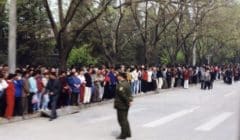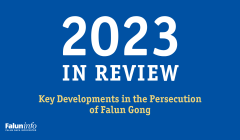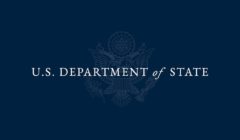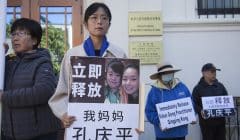New Report: Beijing’s Persecution of Falun Gong Reaches American Universities

New York—The Chinese Communist Party’s (CCP) campaign to demonize and eliminate the Falun Gong spiritual practice is being felt by students and faculty at university campuses across the United States, according to a report published today by the Falun Dafa Information Center.
The study, which focuses on the period from 2017 onwards, found that Beijing’s influence efforts have included physical and digital surveillance, reprisals against Falun Gong practitioners’ relatives in China, Chinese-language textbooks containing false and damaging depictions of the practice, and attempts by CCP-linked student organizations to cancel activities related to Falun Gong.
“Alongside the violent persecution within China, for over 20 years, Falun Gong practitioners outside China—be they Chinese nationals, members of the diaspora, or non-Chinese believers—have been a primary target of transnational repression and other forms of harassment around the world,” says Levi Browde, one of the report authors and executive director of the Falun Dafa Information Center. “This phenomenon is now playing out at universities across America.”
The study titled Surveillance, Slander, and Censorship draws on a wide-ranging survey, interviews, and publicly available information. It offers the most comprehensive articulation to date of the scope, nature, and tactics of CCP influence on university campuses and their impact on the lives of students and faculty who practice Falun Gong, with a focus on the period since 2017.
The center found that at least 45 universities and colleges across the United States have students or faculty who practice Falun Gong. Many campuses have Falun Gong clubs that host meditation classes, art exhibits, and film screenings to enhance awareness about the persecution in China. Nevertheless, one-fifth of survey respondents reported feeling uncomfortable self-identifying as a Falun Gong practitioner due to CCP propaganda or other influences, while many others raised concerns about surveillance of their activities, even when they were not from China.
“Whenever I and my club held a booth for our Falun Dafa student club, there was always a suspicious Chinese student wandering about and pretend[ing]to be on their phones and constantly checking on us,” relayed a non-ethnic Chinese graduate student at a university in Minnesota. “They never engaged with us but were just there to monitor us.”
Chinese Student and Scholars Associations (CSSA) that are known to have ties to local Chinese consulates, also emerged as an avenue for problematic influence. The associations or their members have engaged in multiple attempts since 2017 to censor or penalize Falun Gong-related activities on university campuses, with long-term repercussions even when demands were not met. University representatives have appeared unprepared for false claims made about Falun Gong, including by CSSA members, and have not always provided equal opportunity for Falun Gong Club representatives to respond.
“Many university faculty and administrators are ill-equipped to address the problems related to CCP influence and to offer protection for both Falun Gong believers and others—especially Chinese international students—on campus,” says Browde. “More must be done by universities and policymakers to pre-empt, monitor, deter, and counter CCP activities. That is the best way to protect freedom of expression, freedom of belief, and non-discrimination for all students, faculty, and staff, including those who practice Falun Gong.”
The brief offers detailed recommendations to universities on preventative actions that can be taken before censorship or intimidation occurs, as well as guidance on how to respond when an incident takes place. It calls on policymakers to share information with universities, create a reporting mechanism for incidents, censure Chinese diplomats when they behave inappropriately, and include Falun Gong witnesses in hearings on transnational repression.
Read the full report here.
To interview the report authors or request a private briefing, email [email protected].








